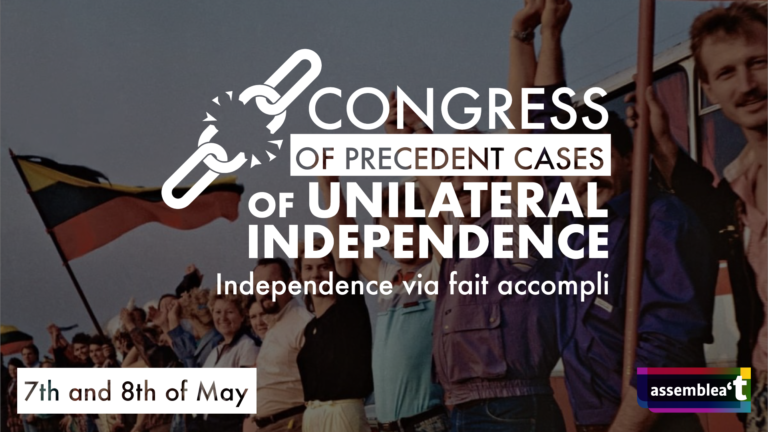
The Catalan National Assembly is organizing the “Congress of Precedent Cases of Unilateral Independence”, to put unilateral independence back on the table, and learn from the experience of states that achieved it successfully.
On the 7th and 8th of May, former representatives and civil society leaders from the Baltic states and Slovenia will join an online international congress which will deal with the independence processes in their respective countries, to gain insight into the future steps of the Catalan pro-independence movement. The two-day event will consist of five workshops, held over zoom in closed sessions. The inauguration and the closure of the event will be broadcast through Assemblea’s social media channels.
Representatives Dimitrij Rupel, the Slovenian Foreign Minister during the independence process and between 2000 and 2008, a former mayor of Ljubljana, and a/the spokesman for the international observers during the 1-Oct referendum; Ülo Laanoja, one of the organizers of the Baltic Way, and a former Member of the First Independent Parliament of Estonia; and Vents Armands Krauklis, the mayor of Valka municipality, and a leader of the Latvian Popular Front in the Valka region during the independence process, will share their knowledge and offer distinct points of view during the sessions.
In addition, the Congress will count on the participation of speakers Ramón Grosfóguel, a Puerto Rican activist and sociologist from the Department of Ethnic Studies at the University of California at Berkeley, and Catalan experts and academicians Albert Noguera, Eulàlia Pasqual, Xavier Cuadras, Jordi Arrufat and Daniel Soler. The inaugural event will include an initial greeting and welcome from Assemblea President Elisenda Paluzie,and will be presented and moderated by Vilaweb journalist and director Vicent Partal.
In order to take part in the workshops, attendees are required to register free of charge at https://independenciesunilaterals.assemblea.cat/en/. Each of the workshops will have a capacity of up to 60 participants.
The examples of the Baltic countries and Slovenia have been chosen since they are geographically and chronologically close to Catalonia—this year is the 30th anniversary of their independence, and for having been achieved in the face of a much more powerful state by means of a democratic deluge, civil disobedience and fait acompli.
To this end, these processes will be analyzed from points of view such as economics, defense and security, international relations, their constituent processes, or their strategies of civil disobedience, in order to draw lessons and teachings that may be useful for the Catalan independence cause.